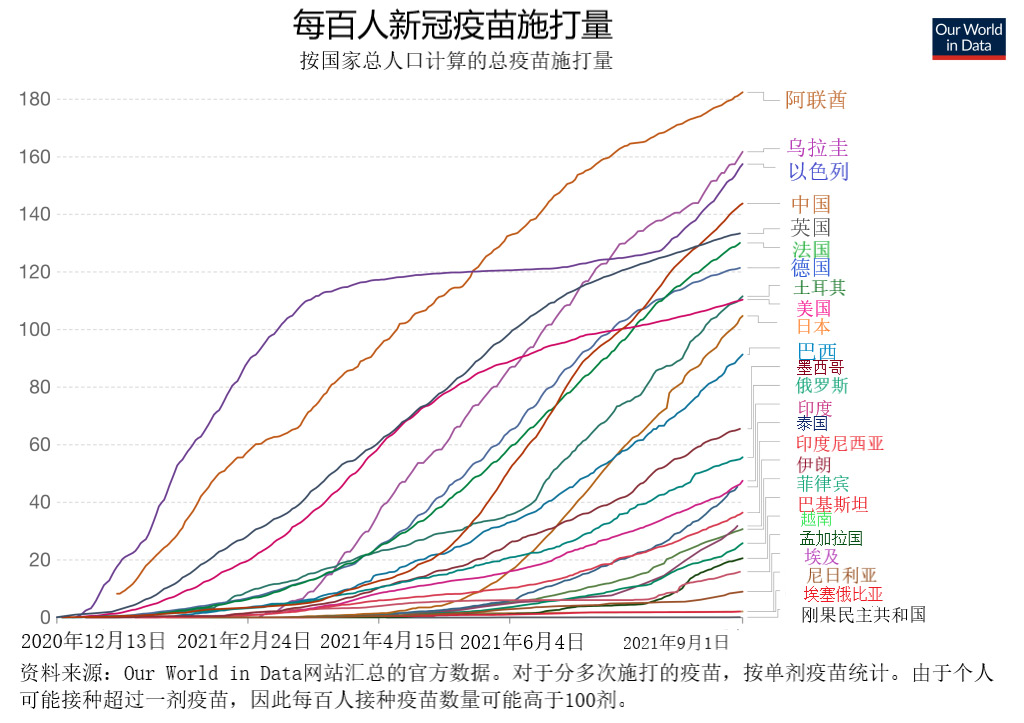醫(yī)學專家在討論全球疫情時通常不會用“令人震驚”和“犯罪”這種字眼。
但最近幾天,,一些全球頂尖新冠專家卻變得異常憤怒,,因為美國、一些歐盟國家和以色列均計劃施打新冠疫苗加強針,,傳染病專家警告加強針計劃將導致落后國家的疫苗劑量大幅減少,,延長疫情,,最終導致更危險的新冠變種病毒傳播。
世界衛(wèi)生組織的總干事譚德塞于9月1日在柏林說:“我們不希望看到已經完成疫苗接種的健康人大范圍施打加強針,?!彼厣晔澜缧l(wèi)生組織之前的呼吁,要求各國將第三針疫苗施打計劃推遲到下個月,,從而使疫苗供應不足的貧困國家能夠趕上發(fā)達國家,。
譚德塞稱:“我們看到疫苗供應方面依舊存在嚴重的不公平?!?/p>
加強針計劃引起了全世界科學界和政府部門的混亂,,人們不禁要問,既然富裕國家疫苗過剩,,那么為什么不給貧窮國家,?貧窮國家連給一小部分人接種疫苗都沒有做到。
例如,,美國當局決定從本月晚些時候開始為數(shù)以百萬計美國人施打加強針疫苗,,此舉導致美國食品與藥品管理局兩名負責疫苗事務的官員在8月31日辭職表達抗議。
在這種高度緊張的情況下,,疫苗制造商紛紛采取措施增加新冠疫苗產量,,但許多疫苗都是加強針。
輝瑞(Pfizer)的加強針已經向美國食品與藥品管理局遞交審批,,該疫苗將以Comirnaty之名銷售,,而歐洲藥品管理局上個月批準了位于法國和德國的兩家新輝瑞-BioNTech工廠生產加強針疫苗。Moderna正在擴大美國馬薩諸塞州和新罕布什爾州的產量,。
嚴重分歧
富裕國家和貧窮國家在新冠疫苗問題上的分歧日益加劇,。
經濟學人智庫上周發(fā)布的一篇報告稱,到目前為止的全世界50億劑疫苗中,,10個富裕國家施打了約75%,,這種分裂到2023年可能給全球經濟造成2.3萬億美元的損失。
比如,,法國經過夏季提高疫苗接種率的大規(guī)?;顒又螅诳傆?,600萬人口中,,約有65.6%已經完成了疫苗接種,。相比之下,非洲有12億人,,卻只有2%完成了疫苗接種,。
即便如此,在9月1日,法國成為向65歲以上人口提供第三劑加強針疫苗的首個歐盟國家,,盡管歐盟的傳染病主管部門于同一天表示加強針完全沒有必要,。
以色列已經有60%的人口施打了兩劑輝瑞-BioNTech疫苗。7月,,以色列開始向60歲以上人口施打加強針,,成為首個施打加強針的國家。
這些國家的做法引起了知名科學家的強烈批評,,他們認為加強針會直接影響貧窮國家的疫苗供應,。
世界衛(wèi)生組織的高級顧問、著名流行病學家布魯斯·艾爾沃德在上周告訴《科學》(Science)雜志:“你要面對的是一種有限的零和資源,。你們正在減少更急需疫苗國家的供應量,。”
位于南非德班的夸祖魯-納塔爾大學(University of KwaZulu-Natal)的生物學家圖里奧·德·奧利維拉告訴《科學》雜志,,加強針“至少是不公平的,,甚至可以說它等同于犯罪?!?/p>

歐洲疾病預防與控制中心(European Center for Disease Prevention and Control)認為,,從醫(yī)學角度看,加強針疫苗也沒有必要,。在9月1日的一篇報告中,該歐盟機構表示加強針“沒有迫切的需求”,,只有體弱多病者需要施打,。該機構表示,人們顯然忘記了疫苗的目的是防止住院治療和死亡,。報告稱,,在這方面,兩劑新冠疫苗“目前能夠提供較高的保護力,?!?/p>
你可以試著把這番話告訴法國等富裕國家的普通人。這些國家都有足夠的疫苗,,能夠在本地的藥店或疫苗接種中心免費施打,。
去年12月,法國的疫苗接種計劃開局不利,,因此法國總統(tǒng)埃馬紐埃爾·馬克龍一直在努力推動疫苗接種,,甚至要求民眾進入餐廳、酒吧,、博物館,、電影院和購物中心等場所都需要出具完成疫苗接種的證明。
對于許多法國人而言,,沒有任何理由不接種第三劑疫苗,。
法國服裝公司W(wǎng)eill的首席執(zhí)行官,,68歲的伯納德·韋爾于9月1日對美聯(lián)社(Associated Press)說:“保證自己和身邊人的身體健康,這就是第三劑疫苗的意義,?!闭f這番話的時候,他正坐在巴黎右岸的一家藥店,,搶在第一天接種加強針疫苗,。他表示,接種疫苗“沒有什么好擔心的,,他也不關心,。”
是的,,富裕國家確實沒有什么好擔心的,,至少目前如此。(財富中文網(wǎng))
翻譯:劉進龍
審校:汪皓
醫(yī)學專家在討論全球疫情時通常不會用“令人震驚”和“犯罪”這種字眼,。
但最近幾天,,一些全球頂尖新冠專家卻變得異常憤怒,因為美國,、一些歐盟國家和以色列均計劃施打新冠疫苗加強針,,傳染病專家警告加強針計劃將導致落后國家的疫苗劑量大幅減少,延長疫情,,最終導致更危險的新冠變種病毒傳播,。
世界衛(wèi)生組織的總干事譚德塞于9月1日在柏林說:“我們不希望看到已經完成疫苗接種的健康人大范圍施打加強針?!彼厣晔澜缧l(wèi)生組織之前的呼吁,,要求各國將第三針疫苗施打計劃推遲到下個月,從而使疫苗供應不足的貧困國家能夠趕上發(fā)達國家,。
譚德塞稱:“我們看到疫苗供應方面依舊存在嚴重的不公平,。”
加強針計劃引起了全世界科學界和政府部門的混亂,,人們不禁要問,,既然富裕國家疫苗過剩,那么為什么不給貧窮國家,?貧窮國家連給一小部分人接種疫苗都沒有做到,。
例如,美國當局決定從本月晚些時候開始為數(shù)以百萬計美國人施打加強針疫苗,,此舉導致美國食品與藥品管理局兩名負責疫苗事務的官員在8月31日辭職表達抗議,。
在這種高度緊張的情況下,疫苗制造商紛紛采取措施增加新冠疫苗產量,但許多疫苗都是加強針,。
輝瑞(Pfizer)的加強針已經向美國食品與藥品管理局遞交審批,,該疫苗將以Comirnaty之名銷售,而歐洲藥品管理局上個月批準了位于法國和德國的兩家新輝瑞-BioNTech工廠生產加強針疫苗,。Moderna正在擴大美國馬薩諸塞州和新罕布什爾州的產量,。
嚴重分歧
富裕國家和貧窮國家在新冠疫苗問題上的分歧日益加劇。
經濟學人智庫上周發(fā)布的一篇報告稱,,到目前為止的全世界50億劑疫苗中,,10個富裕國家施打了約75%,這種分裂到2023年可能給全球經濟造成2.3萬億美元的損失,。
比如,,法國經過夏季提高疫苗接種率的大規(guī)模活動之后,,在總計6,600萬人口中,,約有65.6%已經完成了疫苗接種。相比之下,,非洲有12億人,,卻只有2%完成了疫苗接種。
即便如此,,在9月1日,,法國成為向65歲以上人口提供第三劑加強針疫苗的首個歐盟國家,盡管歐盟的傳染病主管部門于同一天表示加強針完全沒有必要,。
以色列已經有60%的人口施打了兩劑輝瑞-BioNTech疫苗,。7月,以色列開始向60歲以上人口施打加強針,,成為首個施打加強針的國家。
這些國家的做法引起了知名科學家的強烈批評,,他們認為加強針會直接影響貧窮國家的疫苗供應,。
世界衛(wèi)生組織的高級顧問、著名流行病學家布魯斯·艾爾沃德在上周告訴《科學》(Science)雜志:“你要面對的是一種有限的零和資源,。你們正在減少更急需疫苗國家的供應量,。”
位于南非德班的夸祖魯-納塔爾大學(University of KwaZulu-Natal)的生物學家圖里奧·德·奧利維拉告訴《科學》雜志,,加強針“至少是不公平的,,甚至可以說它等同于犯罪?!?/p>
歐洲疾病預防與控制中心(European Center for Disease Prevention and Control)認為,,從醫(yī)學角度看,加強針疫苗也沒有必要。在9月1日的一篇報告中,,該歐盟機構表示加強針“沒有迫切的需求”,,只有體弱多病者需要施打。該機構表示,,人們顯然忘記了疫苗的目的是防止住院治療和死亡,。報告稱,在這方面,,兩劑新冠疫苗“目前能夠提供較高的保護力,。”
你可以試著把這番話告訴法國等富裕國家的普通人,。這些國家都有足夠的疫苗,,能夠在本地的藥店或疫苗接種中心免費施打。
去年12月,,法國的疫苗接種計劃開局不利,,因此法國總統(tǒng)埃馬紐埃爾·馬克龍一直在努力推動疫苗接種,甚至要求民眾進入餐廳,、酒吧,、博物館、電影院和購物中心等場所都需要出具完成疫苗接種的證明,。
對于許多法國人而言,,沒有任何理由不接種第三劑疫苗。
法國服裝公司W(wǎng)eill的首席執(zhí)行官,,68歲的伯納德·韋爾于9月1日對美聯(lián)社(Associated Press)說:“保證自己和身邊人的身體健康,,這就是第三劑疫苗的意義?!闭f這番話的時候,,他正坐在巴黎右岸的一家藥店,搶在第一天接種加強針疫苗,。他表示,,接種疫苗“沒有什么好擔心的,他也不關心,?!?/p>
是的,富裕國家確實沒有什么好擔心的,,至少目前如此,。(財富中文網(wǎng))
翻譯:劉進龍
審校:汪皓
“Shocking” and “criminal” are not usually words medical specialists use when discussing a global pandemic.
But in recent days, some of the world’s top experts on COVID-19 have erupted in anger as the U.S., some European Union countries, and Israel roll out plans for vaccine booster shots—programs that infectious-disease experts warn could leave poor countries with deep shortfalls of doses, prolong the pandemic, and potentially spawn more dangerous coronavirus variants.
“We do not want to see widespread use of boosters for healthy people who are fully vaccinated,” the World Health Organization’s Director-General Tedros Adhanom Ghebreyesus said in Berlin on September 1, repeating the WHO’s earlier call for countries to delay their third-jab plans until next month, so that poor countries could work to catch up in their inadequately supplied vaccination programs.
“We still see shocking inequities in access to vaccines,” Dr. Tedros said.
Plans for booster shots have roiled the scientific community and governments around the world, as questions mount over how rich countries have been able to hoard excess vaccine doses while dozens of poor countries struggle to immunize more than a tiny percentage of people.
In just one example, the decision by U.S. authorities to start administering booster shots to millions of Americans beginning later this month reportedly prompted two top vaccine officials of the Food and Drug Administration to quit in protest on August 31.
In this highly combustable situation, vaccine manufacturers have made moves to increase production of COVID-19 doses—but in many cases for booster shots.
Pfizer has applied to the FDA for approval for its booster shot, marketed under the name Comirnaty, and in Europe, the European Medicines Agency last month approved two new Pfizer-BioNTech sites, in France and Germany, to manufacture booster shots. Moderna is scaling up production in Massachusetts and New Hampshire.
Deep divide
If anything, the deep divide between rich and poor countries has grown when it comes to COVID-19 vaccines.
About 75% of the world’s 5 billion vaccine doses so far have been administered in just 10 rich countries—a schism that could cost the global economy up to $2.3 trillion by 2023, according to a report last week by the Economist Intelligence Unit.
In France, for example, about 65.6% of the country’s 66 million are now fully vaccinated, after a major summer campaign to boost immunization rates. By comparison, a minuscule 2% of Africa’s 1.2 billion people are fully vaccinated.
Even so, on September 1 France became the first EU country to offer third-dose booster shots to anyone over 65—a program that even the EU’s own infectious-disease agency said on September 1 was unnecessary.
In July, Israel, where 60% of people are double-vaccinated with the Pfizer-BioNTech vaccine, became the first country to administer booster shots, which they offer to anyone over 60.
Those programs have ignited fierce criticism from leading scientists, who say the booster shots directly impact the vaccines available for poorer countries.
“You’re dealing with a finite, zero-sum resource,” renowned epidemiologist Bruce Aylward, a senior adviser to the WHO, told Science magazine last week. “You are reducing supply for those who need it more.”
Tulio de Oliveira, a biologist at the University of KwaZulu-Natal in Durban, South Africa, told the magazine that the booster shots were “unfair to say the least, potentially…even criminal.”
Booster shots might also be medically unnecessary, according to the European Center for Disease Prevention and Control. In a report on September 1, the EU agency said “there is no urgent need” for booster shots, unless people are in frail health. It said that people have apparently forgotten the purpose of vaccines: to prevent hospitalization and death. In that, the report says, two COVID-19 vaccine doses are “currently highly protective.”
Yet try telling that to regular citizens in rich countries like France, where COVID-19 vaccine doses are plentiful, given at local pharmacies or vaccination centers, and free of charge.
French President Emmanuel Macron drove a massive push to vaccinate the country after a sluggish start to its vaccine program last December—even mandating proof of full vaccination to enter restaurants and bars, museums, movie theaters, and shopping centers.
For many French, there seems no reason why not to receive a third jab.
“When you’re in good health and people around you are in good health, that’s what matters,” Bernard Weill, 68, CEO of the French clothing company Weill, told the Associated Press on September 1, sitting in a pharmacy in Paris’s Right Bank district, where he rushed to get his booster shot on the first day it was available. The vaccine jabs, he said, were “nothing to worry about and nothing to care about.”
Nothing to worry about, that is, for rich countries, and at least for now.






